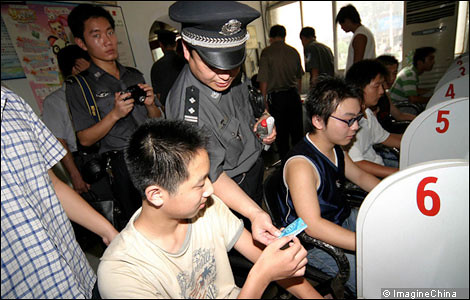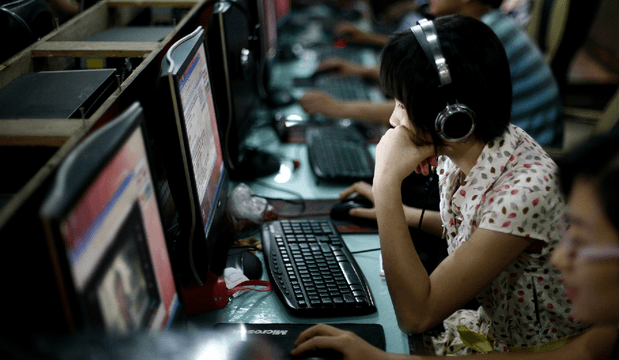Teenagers tend to think of parents as the bane of their melodramatic existence, waging verbal battle when tensions pass their breaking points and erupt all over the living room. Said explosions can go so far as to transform a child’s urge to run long and far away into affirmative action. But what can a fourteen-year-old really do after decisively fleeing the nest? What would they even want to do, for that matter? Well if you’ve ever thought, “it’s not like they can just scamper off into the sunset and play video games for the next 10 years,” you’ve just been proven wrong by the recently rediscovered Xiao Yun.
Listen up, it’s story time
Xiao Yun turned familial tension to consequence after fleeing from home in the eastern Chinese city of Hengdian ten years ago. The police and Xiao Yun’s parents presumed her dead after she went missing following a mother-daughter spat in 2005.
Spoiler alert: Xiao Yun still lives and breathes after a decade straight of, you guessed it, playing CrossFire. (I’m assuming that was your guess; it’s just so dang obvious it hurts.)

Ten years of this. Ten. Years.
Flash forward to November 20th, 2015 in Hangzhou, China, one hundred miles from Xiao Yun’s hometown. Police conducting a routine check on a local Internet cafe in the inhumanly early hours of the morning stumble upon a 24-year-old equipped with a fake ID. With a strict and disapproving wag of the finger, the cops pull the woman from animated gunfire to the police station for questioning. There, they discover the back-story of Xiao Yun.
Police dug past Xiao Yun’s initial cover story, not buying into her claims that she’d been brought up by her grandparents. She finally admitted the truth: She’d run away from home a decade ago at 14 years old.
It turns out Xiao Yun’s been living under a fake name, having tossed aside the social constructs of a permanent income and living under a stable roof in favor of dedicating every free moment in life to her favorite game, CrossFire. Xiao Yun slept in Internet cafes and bathhouses while handouts from fellow gamers filled in the gaps left by a lack of income. The occasional cashier shift at various cafes made up a much smaller portion of her funds.
Despite her initial resistance, the police contacted Xiao Yun’s parents, a couple who stopped daring to hope for such news years ago. Naturally, they also fined her for the fake ID, leaving the young woman with a 1,000 yuan (roughly $150) bill to pay.
Lucky for police and Xiao Yun, her mother never changed their home phone number, telling Qianjiang Evening News she had held out hope that her daughter would contact her one day. It turns out not daring to hope isn’t at all the same as giving up entirely.
 Above: Mother and daughter reunited.
Above: Mother and daughter reunited.
Rather than expressing disappointment or anger, Xiao Yun’s parents met the news with unadulterated joy, thrilled to find their daughter alive and well. They picked her up in Hangzhou, vowing never to quarrel again upon reuniting with their little girl:
“I have a stubborn personality and a short temper, so I used to scold her. But it’s been 10 years and now she’s an adult. I will never scold her again,” – Xiao Yun’s mother
A serious digression – Chinese internet cafes in context
China considers Internet addiction and video game addiction as legitimate and official mental health issues. Cases like Xiao Yun’s are so far from rare and out of place that China began cracking down on Internet cafes over the past six years, seeing them as centers for youth corruption.

According to Bryan Lufkin’s look into the history of Internet cafes on Gixmodoz, an incredible 350,000 Internet cafes had established themselves across Asia by 2011. Cafes have a very specific clientèle to thank for this boom: gamers. Catering to this group boosted cafe revenue up to $19 billion, according to a Pearl Research study that looked at five East and South Asian countries. With Xiao Yun’s tale still in mind, we’ll focus primarily on China.
The popularity of Internet cafes skyrocketed in China during the ’90s and early 2000s. Cafes offer(ed) the extremely cheap use of PCs built specifically for online gaming. A one time cost (per day) for all-you-can-play, high-speed bandwidth quickly promoted a comfortable, affordable, and easy atmosphere, especially given the easily accessible snacks a few feet away. This business stays up 24 hours a day, allowing patrons like Xiao Yun to find shelter within overnight. In 2005, the 2,000 cafes in Wuhan cost just seven cents to play overnight, as an example of the cost and easy accessibility of such places.

Cafes earned the special attention of the Chinese government in 2002 after two teenage boys burned down an Internet cafe in the Beijing university district. The boys argued with employees who in turn wouldn’t allow them to play in the establishment. The then 13- and 14-year-olds took gasoline to the building to express their displeasure with a case of arson. Their fiery temper tantrum resulted in the tragic deaths of 24 patrons and employees, adding murder to their growing list of crimes.

The Chinese government responded immediately, shutting down the capital’s 2,400 Cyber cafes in order to implement proper safety measures. Businesses reapplied for licenses once they were up to code, but all who could not comply with the stricter safety regulations never opened their doors again. Government regulation in China saw 130,000 cafes shut down over the past six years.
Now parents terrified of losing their children to the clinical disorders of addiction seek solace in Chinese boot camps. Brain scans, medication, and mandatory exercise report a 75% success rate in pulling teenagers lives away from an online-centered world. Xiao Yun’s story breaking news outlets certainly won’t deter the sort of fear feeding such measures.

What this all boils down to is simply that Xiao Yun doesn’t stand alone in the sea of gamers willing to run from the world in order to dedicate their lives to play. Her tale sheds light on the reasoning of a government that watched a rise in addiction and seeks solutions and regulation.
What do you think of the cultural divide between the technology-driven generations and their predecessors? Have you seen circumstances in your own life mirroring the fears and reality of addiction in countries like China? Have you personally ever enjoyed a game so much you could yourself playing it for 10 years straight? Contemplate and respond in the comments below. It’s discussion time.








Published: Nov 25, 2015 06:14 am